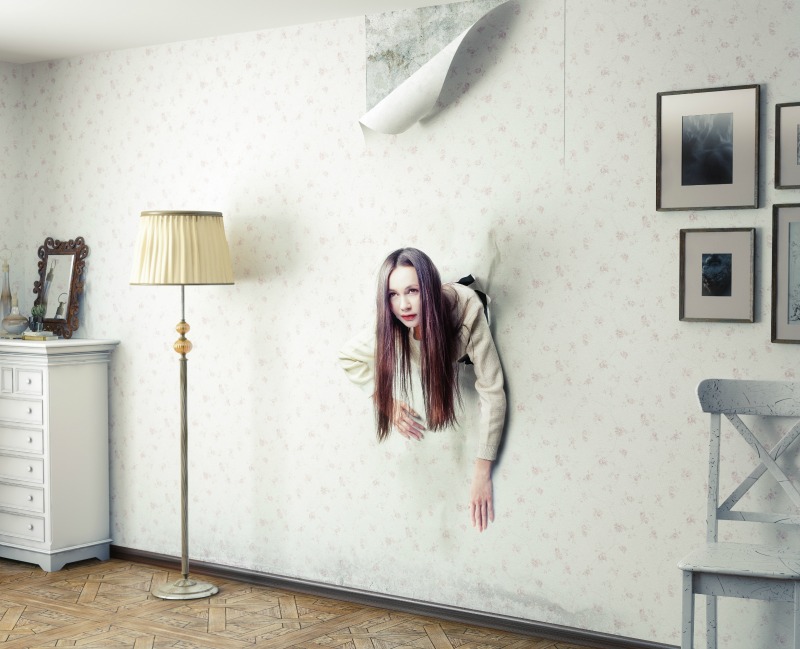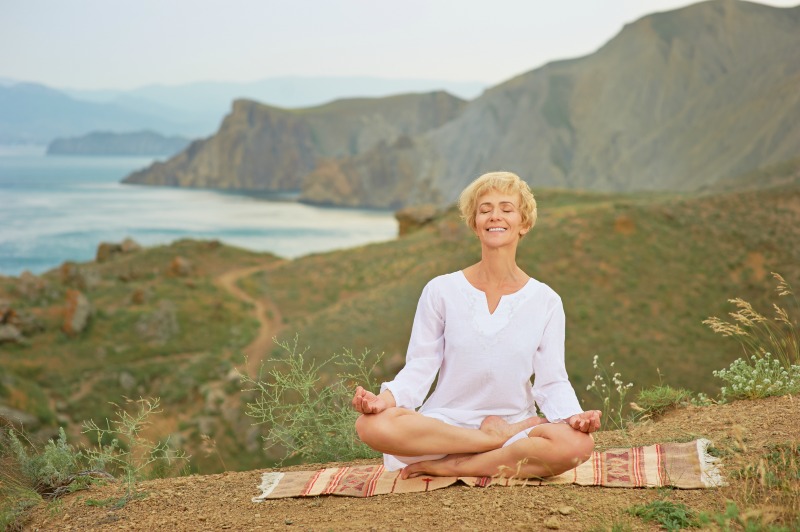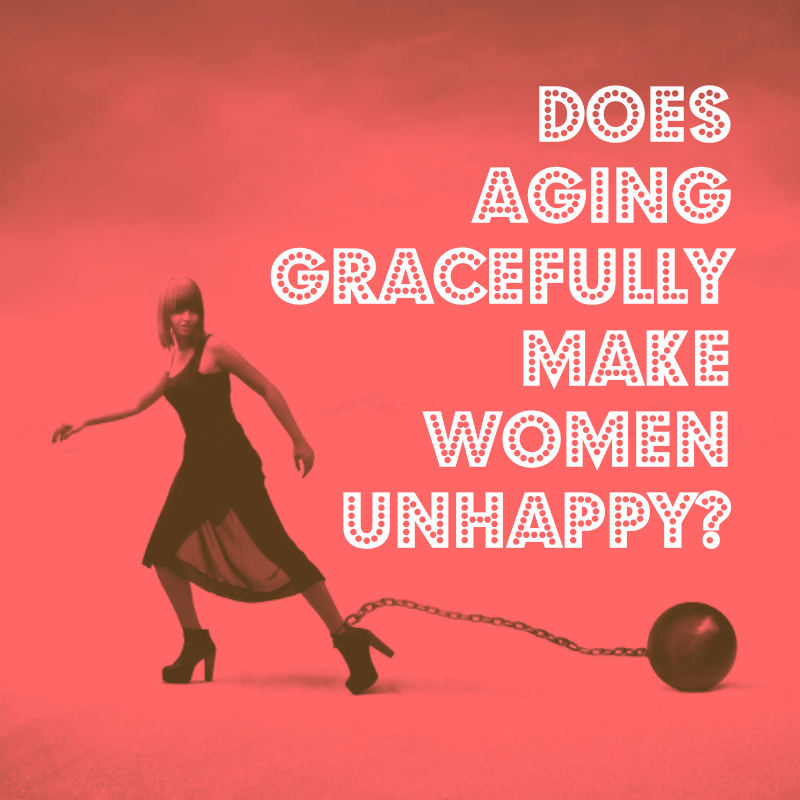Does aging gracefully make women unhappy?
Aging gracefully sounds attractive at first glance. But what does this common label really mean? Does it serve or limit women as we age?
While I wholeheartedly believe in embracing the aging process, “aging gracefully” seems to be used more and more as a euphemism for a resigned acceptance of the aging process. It forces us to put more emphasis on passively accepting what we are losing, versus focusing on the incredible treasures we gain as we age.
“In interviews, the first question I get in America,” says 63 year old Isabella Rossellini, “is always: ‘What do you do to stay young?'”
“I do nothing. I don’t think aging is a problem … I’m so surprised that the emphasis on aging here is on physical decay, when aging brings such incredible freedom. Now what I want most is laughs. I don’t want to hurt anybody by laughing — there is no meanness to it. I just want to laugh.” – Isabella Rossellini
Aging gracefully as a concept is not all bad of course. Being graceful has an alluring aspirational aspect to it, “characterized by elegance or beauty of form, manner, movement, or speech“. But the ideal of aging gracefully is largely looks oriented and based on a narrow patrician standard of beauty and behaviors. Our current approaches to aging, gracefully or otherwise, are not helping women live happily.
Research shows that women get less happy with every passing year
Americans have seen an astounding 400% increase in antidepressant drug use over the last 25 years. The Harvard Health Blog reported that women are 2.5 times more likely to be on them than men, and 23% of women in their 40s and 50s take antidepressants!
Marcus Buckingham spent two decades working at the Gallup Organisation pioneering research into personal strengths. Over the last 40 years he found that while women gained more opportunities and responsibilities, the additional choices we have don’t correlate with more happiness. Buckingham, whose book, Find your Strongest Life: What the Happiest and Most Successful Women Do Differently, found that choice can add to our stress levels and makes life harder. Over this same period women have become less happy than they were historically, and less happy than men.
“Though women begin their lives more fulfilled than men, as they age, they gradually become less happy. Men, in contrast, get happier as they get older.”
Say what? I was not pleased when I first read this. The feminist in me bristled and I thought it was a mistake. I thought possibly this was a politically motivated study meant to urge women back into a more restrictive life with less of the hard-won choices women have fought for. But after doing more digging, the science made sense to me, and it got me thinking that this is a serious issue we need to address.
Keep in mind that these are statistics and therefore not predictive (whew!) or true for everyone, but seriously:
- How is it OK that half the western planet is less happy on average with every passing birthday?
- Why are we not addressing this en masse?
- Not every woman gets less happy with age – so what are happy women doing differently?

Say goodbye to the make-do attitude and get your needs met
I see the positive in the aging gracefully approach. I really do. It was formed from a well-intentioned silver-lining mindset intermingled with a Protestant work ethic. The ethos encourages us to make-do the best we can with what we have. As the British say, we should “just get on with it”.
It’s admirable in a way.
I can imagine previous generations rightly saying, “it’s not all bad: you get discounts on things, better parking spots, and less hassle. You no longer have to worry that people only like you for how you look. It’s what inside that counts.” All good things and all true. But I think our approach to aging needs so much more than a make-do attitude. That is a strategy for mere survival. It’s clear that we desire and are capable of more than that.
There was a time when it was expected that we curtail our lives with every passing year. And at that time, we dutifully adhered to expectations.
Certainly in my grandmother’s day, after the age of 50ish, women were expected to tone down their life. The were expected to cut their hair short, stop wearing anything remotely sexy, and limit hobbies to the familiar and age-appropriate. They were asked to live their lives through other people, and just accept the mounting tsunami of assumed medical problems that would come their way as part of the aging process.
If you could do all of the above with a smile on your face, some pearly pink lipstick neatly in place, and a nicely coiffed hair helmet, you might get the label of “aging gracefully” bestowed upon you. But those actions and the aging gracefully label didn’t help women’s happiness levels over the last 40 years.
Outdated assumptions about the “natural aging process” get in the way of aging gracefully
I firmly believe we need to accept that we age. It’s also unrealistic to have “forever young” type personal expectations about aging. But there are far too many negative stereotypes and erroneous assumptions about “the natural aging process.” I came up against them myself when I was first diagnosed with familial hypercholesterolaemia. If I had bought into the assumptions, and simply accepted my condition as an unavoidable fact of the aging process, it would have greatly limited my health, lifestyle and longevity.
Acceptance can be a blessing and curse
The aging gracefully approach suggests acceptance. This can work for us and against us. Where it hurts is when we think we must accept the scraps of life. Accept that getting diabetes or heart disease is a normal part of aging (science now shows us this is not the case). Accept that getter fatter or feeling less attractive is par for the course (no!), and accept that our time in the world is done. We might be told that our skills and talents have reached a zenith and are now declining (nope, not true). Accept that we’ve had our chance and now must pass on the torch for others to make their mark (why, when older women have so many talents, tools, collaborative ideas and wisdom to offer?)
This end of the road thinking can lead women astray to a life of less emotional satisfaction, less contributing our rich gifts to the world, less sex and even a much shorter life span! This is not ok and it’s only making women less happy as we get older.
Pretending we’re not aging can hurt us as well
But if we’re not growing old gracefully won’t we look like we’re joining the “Pretend We’re Not Aging” (PWNA) brigade? I think the tired cliche of the older woman who is struggling to keep up with her twenty-year-old-self, is one that most women would go to great pains to avoid.
I’m not going to suggest we join the PWNA brigade. This approach actually misses the great bonuses of aging by proclaiming that your earlier age was actually a better you than you are today. By denying any aging is happening, or avoiding changing our approach to life, we miss a huge opportunity to embrace and live the life of the powerful woman that we have become.
We became the woman we are now because of the aging process. If we reject our current age and pine for a younger version of ourselves I think we are missing the potential we have in the present moment for living as powerful and actualized women.

Women need a new way of thinking about aging
Buckingham found it difficult to pinpoint any particular life choices amongst women living what he called a “strong life”. What he did find was that happier women at every age tend to share a set of similar feelings or desire based goals. These women are living lives on their own terms. Specifically, he found that the happiest women:
- have a sense they are meeting their needs
- are constantly growing
- enjoy a feeling of being successful or competent in something they deemed important (could be anything), and
- have an anticipation of the coming day.
The good news is that these feelings can be stimulated by an unlimited combination of activities, people, jobs, relationships, things, and situations that will be unique to every woman. This “formula” for happiness is highly personalized in a way that does not feel formulaic. Work, family, hobbies, spirituality and health can all intermingle to provide your unique blueprint for happiness.
What should we do instead of aging gracefully?
How about aging awesomely, aging powerfully, aging radiantly or aging thrillingly?
We’re just not thriving with the current aging models. But there are many bright spots out there for us to learn from. I will be writing more about how women are going beyond merely aging gracefully to finding that the best is yet to come whether they are 30, 50, 80 or beyond. We need to move from merely accepting or tolerating the aging process to thriving within it and finding more passions, adventures and opportunities with every passing year. Our society has so much to gain from unleashing the untapped potential of millions of unhappy women who could be contributing, growing and blooming year on year.
What do you think? Agree or disagree in the comments below. How do our current models of aging work and/or not work? How can we change our society to allow women to age more happily with every passing year?




Leave A Comment